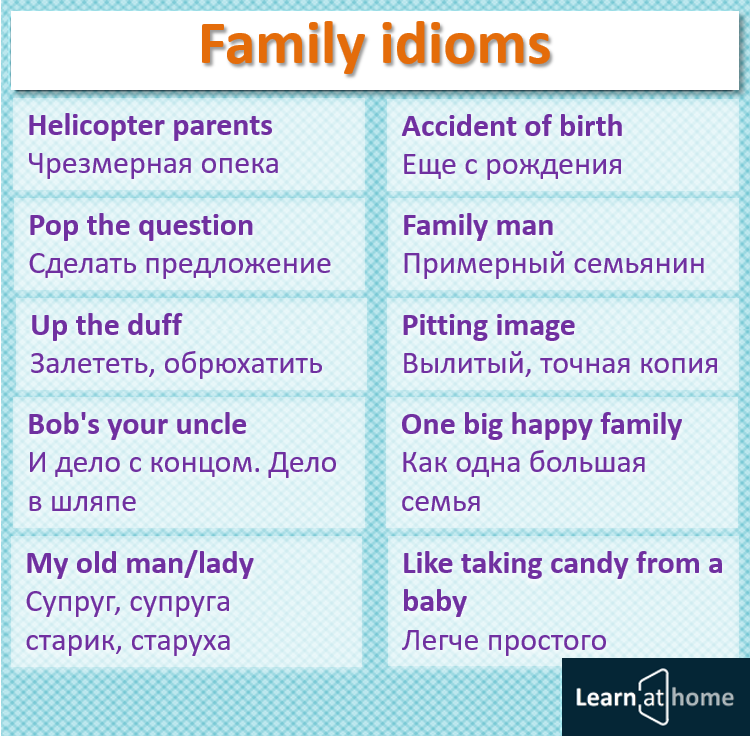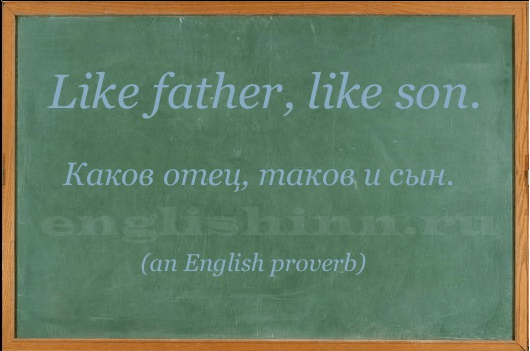Families are dynamic, and many people make a family unique. It’s no surprise there are a lot of family words that can be used to describe members.
Here is a complete list that can be used to describe the different people who make a family unique.
Family Words Defined
A traditional family has a father, mother, and children. But we know that most families include grandparents, aunts, uncles, and cousins. Additionally, many families are non-traditional. This means that there are stepparents, adoptive siblings, and other unique family members who are included in the unit.
Family words are any family members who should be defined when talking about the unit. These include adjectives and nouns.
Remember, an adjective is a descriptive word. A noun is a person, place, or thing.
It is important to know these family words because it adds interest and accuracy to writing. If you are writing something about your family, you will want to correctly identify your family members so that the reader understands who you are talking about.
Since families are so unique, there are many words to describe family members. Use this complete family word list as your resource to write about your own family.
Complete Family Word List
| Words to Describe Women | Words to Describe Men | Words to Describe Children |
|---|---|---|
| adoptive mother | adoptive father | children |
| aunt | bachelor | child |
| birth mother | bridegroom | cousin |
| daughter | brother | descendant |
| daughter-in-law | brother-in-law | firstborn |
| bachelorette | brotherhood | first cousin |
| bride | dad | first cousin once removed |
| ex-wife | fraternal twin | foster child |
| fiancee | grampa | grandchild |
| foster mother | gramps | grandchildren |
| granddaughter | grandfather | identical twin |
| grandma | grandpa | infancy |
| grandmother | great-grandfather | infant |
| granny | great-grandson | juvenile |
| great-aunt | great-uncle | kin |
| great-granddaughter | groom | minor |
| great-grandmother | grandson | natal |
| half-sister | half-brother | offspring |
| heiress | heir | orphan |
| ma | husband | quadruplets |
| maternal | nephew | quints |
| mama | Mr. | quads |
| Miss | papa | second cousin |
| matriarch | pa | quintuplets |
| mom | paternal | stepchild |
| mommy | patriarch | stepchildren |
| mother | pop | teenager |
| mother-in-law | son | toddler |
| Mrs. | son-in-law | triplets |
| Ms. | stepbrother | twins |
| nana | stepdad | youngster |
| niece | stepfather | youth |
| sister | stepson | |
| sister-in-law | twin brother | |
| Mrs. | uncle | |
| Ms. | ||
| nana | ||
| niece | ||
| sister | ||
| sister-in-law |
| Words to Describe Family Units | Words to Describe Family History |
Words to Describe Culture |
|---|---|---|
| adoptive family | adoption | heritage |
| blended family | ancestor | multi-racial family |
| blood relative | clan | bi-racial family |
| care-giver | genealogy | |
| divorce | hereditary | |
| extended family | history | |
| family | inherit | |
| family tree | inheritance | |
| folks | kinfolk | |
| foster parent | kinship | |
| grandparent | lineage | |
| great-grandparent | maiden name | |
| in-law | ||
| nuclear family | ||
| parent | ||
| partner | ||
| senior | ||
| sibling | ||
| single-parent | ||
| unit | ||
| spouse | ||
|
unmarried parent |
A Note About Names
Many families have their own names to describe their family members.
Take, for example, father. This name alone could be transformed into Dad, dada, daddy, pops, papa, pa, or even Faja.
This name will vary from family-to-family, so you might not find the specific name you call your father on our list.
Another approach to family words is the cultural names for family members, specifically when it comes to talking about grandparents. Here is a concise list of different family words from different cultures:
| Country of Origin | Words for Grandfathers | Words for Grandmothers |
|---|---|---|
| French | Grand-pêre | Grand-mère |
| Italian | Nonno | Nonna |
| German | Opa | Oma |
| Spanish | Abuelo | Abuela |
| Polish | Dziadek | Babcia |
| Greek | Poppoús | Giagiá (Yaya) |
| Portuguese | Vovô | Avó |
| Irish | Seanathair | Mhamó |
| Hungarian | Nagypapa | Nagymama |
| Swahili | Babu | Bibi |
| Danish | Bedstefar | Mormor |
| Japanese | O jiichan | O baachan |
| Russian | Dedushka | Babushka |
| Hawaiian | Tutu | Tutu |
| Korean | Hal-abeoji | Halmeoni |
| American | Papa | Nana |
| Creole | Pawpaw | Mawmaw |
| Filipino | Lolo | Lola |
In addition to names associated with culture, you might also find that you use family words from your
. This is specifically clear with words describing parents, grandparents, and cousins.
Using Descriptive Words for Family
In addition to using different words to describe the people in your family, you will also find that you want to use words to describe your family’s personality.
These words will describe how loving, fun, and paint a picture.
| Descriptive Words | |||
|---|---|---|---|
| brotherly | helpmate | nest | sisterly |
| childhood | home | newlywed | support |
| close-knit | household | nuptial | tribe |
| connection | kindred | nurture | trust |
| devoted | love | posterity | trustworthy |
| faithful | loyalty | related | value |
| flesh and blood | marriage | relations | village |
| foster | mate | relative | wed |
| friend | matrimony | separation | wedding |
| grownup | monogamy | single | wedlock |
Conclusion
Family words are a great way to talk about your family accurately. When you use the correct words, you can help your reader track and provide valuable insight into your family.
Here are a few things to remember about family words:
- They are traditionally nouns and adjectives.
- There are hundreds of words to describe your unique family.
- Pay attention to the names that your family uses. This is often tied to your family history and culture.
- Sometimes family names are a reflection of the region where you live.
What words do you use to describe your family? Let us know in the comments below!
It’s important
to learn a good range of family vocabulary as there’s a high chance you’ll
get questions about your family in Part 1 of the IELTS Speaking test.
The topic could also come up in Parts 2 and 3 as well as being the subject of the Writing, Listening or Reading tests.
Here are a few things you could be asked about:
- Facts about
your family
- Details of family
relationships
- Family
activities & celebrations
- A family
member you admire
- Changes in family roles
- The generation gap
- Parental responsibility
- The future of the family
This page
includes over 100 common words and phrases related to the family. I’ve added an
explanation for each one and a sample sentence to show it in context where needed.
This will help you to learn how to use this family vocabulary correctly.
Don’t try to learn them all. Look at my suggestions below as to
the best way to use this list.
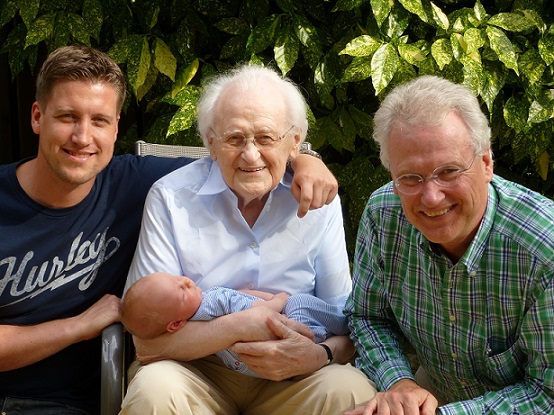
To ensure that you’re well prepared to answer any family-related question, I’ve included four things here:
- IELTS-style questions on the topic of the family
- Sample answers
- A list of common family vocabulary with definitions & sample
sentences
- Links to online reading and listening resources
You’ll find
PDF downloads of both the questions and sample answers and the family vocabulary
list at the bottom of the respective sections.
The questions relate to the Speaking test because this part of
the exam offers the broadest range of possible questions on this topic. They
give the best opportunity for me to demonstrate the vocabulary and for you to
practise using it.
I’ve included IELTS-style questions and answers for all three
parts of the Speaking test. I’ve highlighted keywords and phrases in bold.
You’ll find these words and phrases, and many others, in the
vocabulary list beneath. The list also includes the explanations and sample
sentences and there’s an audio to listen to the pronunciation.
The vocabulary list contains words and phrases relevant
to all parts of the IELTS exam.
Finally, at the bottom of the page, I’ve added links to topical
articles, short videos and podcasts that will help you to improve both your family
vocabulary and your reading and listening skills.
IELTS-Style
Speaking Test Questions and Answers
Common family vocabulary
is highlighted in bold.
Part 1
1) How
many people are there in your immediate family?
Four people make up my immediate family – my dad, my sister and my two bothers.
They all live close to me except for my youngest brother who moved away because
of his work.
2) Do you
get along well with your family?
Most definitely. I used to argue with my brothers and sister a lot when we were. It
was sibling rivalry I guess
but we get on really well
now.
3)
Which member of your family are you closest to?
I’d have to say my sister but we’re a close-knit family and we
all get along just great.
4) How
much time do you spend with your family?
We used to go to my parent’s house for Sunday tea every few weeks but since my mother died, my oldest brother, my sister and I take turns to spend time supporting our father.
This means that we don’t all get together so often. However, we still have family gatherings on special
occasions.
5) When did you last have a family
party?
Just a few
weeks ago. It was for my father’s
birthday. We had a get-together
at his house and we all took along cakes and snacks to share.
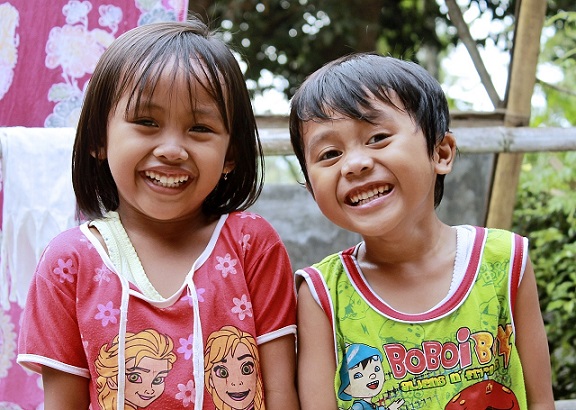
Part 2
Describe
a family celebration that you attended.
You should say:
- where this celebration was held
- why it was held
- what you did at the event
and explain what you enjoyed about the celebration.
One of the
most memorable family events
of recent years was my father’s
80th birthday. We wanted to have a special celebration for him but
decided to keep it a secret so as to surprise him on the day.
My youngest brother, who lives two and a
half hours drive away from the rest of my immediate
family, told Dad that he’d come down with his family so we could all go out for a meal together. What we actually
did was to invite members of our extended
family to come as well without my father
knowing. Most of them live a long way away, like in London or Scotland, so we
don’t see them very often. They came down the day before and stayed in local
hotels.
There was a
lot to arrange and it was difficult to sort everything without Dad guessing
what we were up to. There were several times when I thought he must know
something was going on but was just playing along and pretending he didn’t.
We booked a
table at a local restaurant and on the day, my sister decorated it with balloons and other party bits and
pieces. It looked amazing. It was a very long table as in the end there were
more than twenty family members
at the meal. So, as well as my parents
and my siblings, there were also
nieces, nephews, aunts,
uncles and cousins. I think it was probably
the biggest family gathering
we’d ever had.
We arranged
for Dad and Mum to be the last to arrive so that everyone else could be seated
at the table waiting for them. I’ll never forget Dad’s face when he walked into
the restaurant. He hadn’t guessed what we were arranging and it was a real
surprise to him to see everyone there.
We had a
lovely meal together but the best thing was spending time with all our relatives. It made me realize
what a close-knit family we
are even though we don’t see each other very often. I think that Dad enjoyed it
too and I hope it showed him how much he means to our whole family.

Part 3
1) In what ways can people in a
family be similar to each other?
Both immediate
and extended family members
often have a lot of similarities. For example, they can look alike. My brother
Steve is the spitting image
of our cousin Peter, while my sister takes after our mother
in the way she both looks and talks.
Also, relatives
may be good at the same things or do similar types of work. Most of my extended family are either
teachers or scientists.
Specific interests often run in the family. In my family, we all love the outdoors and nature, particularly the
older generation. Younger family members do like to go out
walking as well but now that my nieces
and nephews are all teenagers, they spend a lot of
time on their electronic gadgets.
The final way that people in a family can be alike
is in their personality, and especially in their sense of humour.
2) In terms of personality, are
people influenced more by their family or by their friends?
In my
opinion, personality is mostly hereditary.
I think that the main traits of a person’s character are passed down from parents to their offspring. Some people are more
like their father, others
more like their mother but
most of us can recognise characteristics of both parents in our own personality. For example, I’m quiet like
my dad and have my mum’s creativity.
How children are raised
also affects the way they think, feel and behave as they grow up. Kids from a
happy, stable family background generally
have a normal personality. However, an unhappy childhood, which may include some form of abuse, will
definitely affect a child’s mental development and their character later in
life.
This suggests that personality can change so it’s probably
true that the people we spend time with as friends and colleagues also
influence the way we think, feel and behave. However, I don’t think that they
alter our deepest character.
So in conclusion, I’d say that an understanding of
personality is quite complex and involves both hereditary and social factors.
3) How has the role of elderly people in the family changed
in recent times?
In the past,
the older generation was
highly respected in most cultures. They were considered to be wise because of
all the things they’d learnt in their long lives. Elderly family members would have been family leaders, teachers and spiritual guides to the younger generation. They helped
to maintain the structure and stability of the family.
One of their
most important roles was to pass on the old traditions and to maintain
traditional culture. The other vital job they did, especially the grandmothers, was to provide childcare for their grandchildren. They would
certainly have played an important role in their upbringing.
In my
country, most of this changed when it became normal for adult children to move
away to study and get better jobs. Family
ties are no longer so strong and elderly people aren’t respected as
they once were. Grandparents
aren’t the people we usually go to for advice these days. To be honest, many
elderly people don’t have a significant role in most families any more.
However, many do still look after
the grandchildren if they
live close to them.
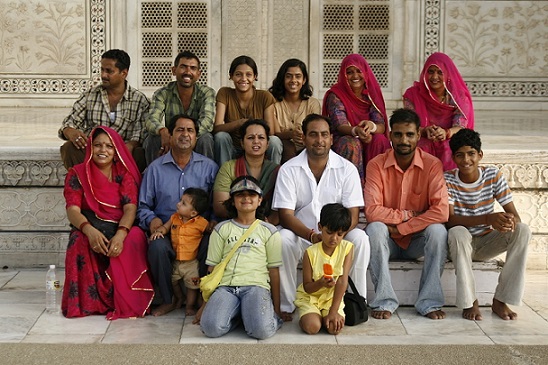
Click this link to get a PDF download of these practise questions & sample answers.
Download PDF Now
Family Vocabulary
* Important
- Do not try
and learn this list of family vocabulary.
- Identify
the vocabulary you find useful for answering practise questions about the family.
- Record
these in your vocabulary notebook and practise using them regularly.
I recommend that you create
your own answers to the Speaking questions on this page. You will find many
other IELTS-style practise questions by searching online.
For help on how to learn
vocabulary, what to learn and how to record it, visit these pages:
How to Learn Vocabulary for
IELTS
Top 6 Types of IELTS
Vocabulary & Topic Word Lists
Family Vocabulary – Common Words & Phrases
Family Vocabulary Set 1: Types of Family
family – a
group of people who are related to each other
— Mohit
was very nervous when he met his girlfriend’s family for the first time.
immediate family –
your closest relations, such as your parents, children, husband or wife
— My
immediate family are my dad, mum and
two sisters.
nuclear family –
parents and their children
—
The average nuclear family in the US
is made up of parents and two children.
extended family – a family unit that includes grandmothers,
grandfathers, aunts, and uncles, etc. in addition to parents and children
— I have a large extended
family with many nieces, nephews and cousins.
dysfunctional family – a family that is not behaving or
working normally, where there is conflict, misbehaviour, etc.
— Cynthia came from a dysfunctional family and could often be
seen wandering the street on her own when she was young.
Family Vocabulary Pronunciation
Family Vocabulary Set 2: Family Members — General Terms
family member – someone
who belongs to a specific family
— I have family members
living all over the world.
to be related to – to belong to
the same family as
— I’m related to many people in my village as my family has lived here
for generations.
a relative – someone
who is part of your family
— We are going to visit
relatives who live on the coast for our holiday this year.
blood relative – someone you are related to
through birth rather than marriage
— Aunty Sylvia is my blood relative but Uncle George, her
husband, is only related to me by marriage.
distant relative – generally, a relative who
is a third cousin or greater, or a great aunt or uncle, especially when you
have little or no involvement with him or her.
— A member of my family died last
week but they were a distant relative
and I didn’t know them very well.
next
of kin – the person or group of people you are most closely related to
— When you apply for a passport, you have to name your next of kin in case there is an
emergency while you are away travelling.
descendants
– a
person who is related to you and who lives after you, such as your child or
grandchild, and all future generations
ancestors
– family members from past generations
— I’m writing my autobiography so
that my descendants will know what
life was like for one of their ancestors.
household – all
the people who live in one house
— There
are now only three people in my household as my older brother has gone
away to university.
Family Vocabulary Pronunciation
Family Vocabulary Set 3: Immediate family
father – a man in relation to his child or children
mother – a woman in relation to her child or children
parent – father or mother
husband – the male partner in a marriage; a
married man
wife – the female partner in a marriage; a
married woman
spouse – a husband or wife
son – a person’s boy child
daughter – a person’s girl child
brother – a male who has the same parents as another person
sister – a female who has the same parents as another person
big
brother / older brother (or sister) – older
than you
little
sister / younger sister (or brother) – younger
than you
— I
have two younger sisters but I do
wish I had an older brother.
sibling – a brother or sister
— I have three siblings,
two brothers and a sister.
twin – either of two children born to the same mother on the
same occasion
— My sister has just given birth to twins, a boy and a girl.
identical
twins – twins
who look exactly the same
— I
have an identical twin brother and
even our parents find it difficult to tell us apart.
an only
child – a child who doesn’t have any brothers
or sisters
— It can be lonely being an
only child as you don’t have siblings to play with.
Family Vocabulary Pronunciation
Family Vocabulary Set 4: Extended family
uncle
– the brother of your
mother or father
aunt
– the sister of your mother or father
nephew
– the male child of your
brother or sister
niece
– the female child of
your brother or sister
cousin
– a child of your uncle
or aunt
grandparents – the parents of your parents
grandfather – the father of your mother or father
grandmother – the mother of your father or mother
grandchildren – the children of your children
grandson – the son of your son or daughter
granddaughter – the daughter of your son or daughter
Family Vocabulary Pronunciation
Family Vocabulary Set 5: In-laws
in-laws – the relatives of your husband or wife
—
When we were first married, we couldn’t afford a place of our own so lived with
the in-laws.
mother-in-law
– mother of your spouse
— Many people don’t
get on with their mother-in-law but
mine is really nice.
father-in-law
– father of your spouse
— My father-in-law offered me a job in the
family business so he is also my boss.
son-in-law – the husband of your daughter
— I didn’t like Amir
when I first met him but he’s a great son-in-law
and helps me out whenever I need it.
daughter-in-law – the wife of your son
— We are very happy
that our son has decided to marry Zehra and look forward to her becoming our daughter-in-law.
brother-in-law – the husband of your sister
— My brother-in-law is lazy and not a
very good husband to my sister.
sister-in-law – the wife of your brother
— I often help my sister-in-law to look after my baby
niece.
Family Vocabulary Pronunciation
Family Vocabulary Set 6: Stepfamilies
step –
in the context of family relationships, ‘step’ means that you are related to
the person because of one of your parents
marries one of their parents
stepmother
– the wife of your
father, but not your biological mother
stepfather – the husband of your mother, but not
your biological father
stepson – the son of your new wife or husband, but not
your biological son
stepdaughter – the daughter of your new wife or
husband, but not your biological daughter
stepsister – the daughter of your stepmother or stepfather
stepbrother – the son of your stepmother or
stepfather
half-brother – a brother you have only one parent in
common with
half-sister – a sister you have only one parent in
common with
Family Vocabulary Pronunciation
Family Vocabulary Set 7: Parenting
parent – a person’s father or mother
—
I’m glad that my parents live close
by as it’s easy to visit them.
motherhood – the
state of being a mother
—
I’d like to have children one day but I’m not ready for motherhood yet.
fatherhood –
the state of being a father
— Sakda
is taking the responsibilities of fatherhood
seriously and now only goes out drinking with his friends once a month.
to start
a family – to have
children
—
Billy and I are planning to start a
family as soon as we get married.
to give birth – to have a baby
— It was a special moment in Cesar’s
life when he saw his wife giving birth
to their first child.
offspring
– a
person’s child or children
— My two sisters are coming over
later with their offspring so the
house is going to be very noisy.
family
man – a man who enjoys
being at home with his wife and children
—
Deepak used to love partying but now that he has kids he’s become a real family man.
family
life – the
kind of life a person normally leads when they are married and
have children
— My
husband and I enjoy doing lots of activities with our children and we all have
a great family life together.
to raise (a child) – to take care of a child until they become an adult
— It’s a big responsibility raising children but I love being a
parent.
to bring up (a child) – to raise a child
— When Jae-min’s husband died, she
was left to bring up the children on her own.
upbringing – the way in which you
are treated and educated when young, especially by your parents
— I was fortunate to have a good upbringing but not all children have
caring parents who look after them well and teach them the right way to behave.
to support (a
family) – to have enough money to be able to look
after a family
—
Egor earned very low wages and had to work two jobs to support his family.
Family Vocabulary Pronunciation
breadwinner – the
member of a family who earns most of the money that the family needs
— In many countries, men are expected to be the breadwinner in a
family.
dependant – someone who depends on you for financial support,
such as a child or family member who does not work
— I‘m working hard to get a promotion and earn more
money now that I’m a husband and a father and have dependants who rely on me.
to adopt – to legally
take another person’s child into your own family and take care of them as your
own child
— Paul and Siri were unable to have children of their own and
decided to adopt a baby.
to
foster – to take care of someone else’s child, usually for a limited
time, without becoming the child’s legal parent
— Even though I’m an only child, I always had other boy’s and
girl’s to play with when I was growing up as mum and dad often used to foster other children.
over-protective parents – a parent who protect their child too much
— Overprotective parents can
prevent their children from building confidence
and independence.
spoilt child – a child who shows bad behaviour because they have
been allowed
to do or have anything they want
— I don’t like playing with the
girl next door because she’s a spoilt child and gets in a temper if I don’t let her win all the games.
single parent – a person bringing up a child or children
without a partner
— My sister is a single
parent now that her husband has left her.
stay at home parent / stay at home mum – a parent who stays
at home to take care of their children rather than going
out to work
— These days, it’s far more usual
for men to be a stay-at-home parent
than when I was young when it was always the mother who looked after the kids.
to look after – to take care of
— I’m going to look after my daughter’s children on Saturday while she has a
day out with her friends.
childcare – the care of children,
especially by a crèche, nursery or childminder while parents are working
— Childcare is a big problem for many
working parents and they are lucky if their own parents can help out.
strict – strongly limiting someone’s freedom to behave as
they wish, or likely to severely punish someone if they do not obey
— My
parents are very strict with
me and I have to finish all my homework before I’m allowed to play or watch TV.
authoritarian – demanding that people obey completely and refusing
to allow them the freedom to act as they wish
— My father was very authoritarian when I
was growing up and I was terrified of him.
Family Vocabulary Pronunciation
Family Vocabulary Set 8: The Generations
generation – all the people of about the same age within a society
or within a particular family
— It’s hard to believe how much everyday life has changed for
my grandparent’s generation.
older generation –
people of middle-age and older
younger generation – young
adults, teenagers and children
— The
older generation are often stuck in
their ways, while the younger generation
welcome change.
generation gap – a
difference of opinions between one generation and another regarding
beliefs and attitudes, often leading to a lack of understanding between them
— It’s a skilled politician who can bridge the generation gap.
teenager – a person aged between 13 and 19 years
— My lovely little boy turned into a rebellious monster when
he was a teenager but now he’s a
lovely young man.
adolescent – a young person who is developing
into an adult
— Many adolescents develop emotional problems as they try to find their place in the world.
Family Vocabulary Pronunciation
Family Vocabulary Set 9: Other vocabulary
sibling
rivalry – the feeling of
competitiveness that often exists between brothers and sisters
— There was huge sibling rivalry between my two brothers
and they were always fighting but they are the best of friends now that they’re
adults.
run
in the family – a
common feature in a family; something which is passed from parents to children
—
Artistic ability seems to run in the family.
hereditary – passed from the genes of a parent to a child
—
Diabetes is hereditary in our family so I make sure that I eat healthily and
keep fit to lessen my chances of getting it.
childhood – the time when someone is a child
— Many children in the world do not have a happy childhood.
family background – the details of a
person’s family regarding education, social status, etc.
— We want our son to marry a girl from a good family background.
family gathering / family get-together – an
informal event where family members meet up
— We’re having a family get-together to celebrate my mother’s
birthday.
close-knit – involving groups of people in which
everyone supports each other
— We’re a close-knit
family and know that we can rely on each other when one of us needs help.
family ties – the sense of connection between
family members
—
Family ties aren’t as strong as they
used to be in my country because relatives often live many miles apart and even
in different countries.
to care for – to provide the things someone needs,
especially someone who is young, old, or ill
— In my country, sons and daughters
are expected to care for their
elderly parents.
a widow – a woman whose husband has
died
— Her
husband died young and she has been a
widow for almost thirty years now.
a widower – a
man whose wife has died
— My
mother died last year so my father is now a widower.
to desert – to leave someone without help or in a difficult situation and
not come back
— My father deserted us when I was young and my mother has brought me up on her
own.
Family Vocabulary Pronunciation
Family Vocabulary Set 10: Idioms
There
are many idioms about the family but I’ve chosen just a few that might prove a
useful addition to your family vocabulary. Pick only one or two to learn and
make sure that you know how to use them 100% or they won’t make sense.
If
you’re unsure about them, give them a miss rather than risking sounding silly.
get
on with / get along with – to
like someone and have a friendly relationship with them
— I
used to fight with my siblings when we were young but I get on with them really well now that we’re adults.
to
fall out with / to have a falling out – to have a disagreement which ruins a
relationship with that person
— I fell out with my sister when she
started dating my boyfriend.
—
The two brothers had a falling out
over the broken toy.
on
speaking terms – friendly enough to talk
— My parents had a big argument and
are not on speaking terms at the
moment.
to
look alike – to look very similar to someone
else
— My twin sister and I look alike and people often call us by
each other’s names.
to take after (someone)
– to be very similar to an older family member
—
Mila was excellent at drawing. She took
after her mother who was a famous artist.
a
chip off the old block – the person is very similar (in
character and personality) to one of their parents
—
Sanjay is always cracking jokes, just like his father. He’s a real chip off the old block.
to
follow in someone’s footsteps – to do the same thing as someone else did previously,
especially someone in your family
— I want to follow in
my father’s footsteps and become a
doctor like he is.
spitting
image – to look extremely
similar to someone
— Cher is the spitting image of her mother.
wears
the trousers – to
be the person in a family who holds the authority and makes decisions
— My
dad likes to thinks that he’s in charge but it’s my mother who wears the trousers in our house.
black
sheep (of the family)– someone
who brings shame to their family by being different or doing something wrong
— My
brother first started getting into trouble with the police when he was a
teenager and he’s become the black sheep
of the family.
Family Vocabulary Pronunciation
Click this link to get a PDF download of this list of family vocabulary.
Download PDF Now
Ways to Improve Your Family Vocabulary
One of the best
ways to improve your family vocabulary is through reading. Watching topic related YouTube
videos and listening to podcasts is also hugely beneficial.
Here are some
online resources I recommend.
Articles About the Family
Australian
Institute of Family Studies
Raising Children – The Australian
Parenting Website
The Independent — Family
The New York Times — Family
TED Talks
I love TED Talks. They are short videos
with a powerful message and are generally very interesting. They’re ideal for
improving your vocabulary and give valuable listening skills practise.
Search TED Talks — The Family & TED Talks — Parenting to help you improve your family vocabulary.
All Topic Vocabulary
Like this page?
-
Home
-
IELTS Vocabulary
-
Family Vocabulary
›
›
-
Back To Top
When it comes to learning English vocabulary topic, family is probably one of the most popular topics that we need to learn to be able to communicate fluently with other people.
So how many English words about family do you already know? Let’s check out our blog post below to test your family-related vocabulary and learn some more!
How to effectively learn English vocabulary about family
- Add eJOY eXtension to your Chrome
Download eXtension for free now
- Highlight any new word/ phrase to look up its meanings, definition, and pronunciation. Click on the blue +Add button to save the word to your wordbook.
- eJOY eXtension will help you learn vocabulary in context instead of learning every individual word.
English Vocabulary about Family
1. Theme 1 – Family
 |
Parent noun /ˈpɛrənt/
a mother or father Example: Has Joe met your parents yet? |
 |
Offspring noun /‘ɔf,sprɪŋ/
The immediate descendants of a person Example: She was the mother of many offspring. |
 |
Sibling noun /‘sɪblɪŋ/
A person’s brother or sister Example: I have two siblings, one elder brother and one younger sister. |
 |
Folks noun /foʊks/
Your parents Example: He wrote to his folks every day. |
 |
Husband noun /ˈhʌzbənd/
the man that somebody is married to; a married man Example: That was the day she met her future husband. |
 |
Wife noun /waɪf/
the woman that somebody is married to; a married woman Example: I’ve never met William’s wife. |
Let’s watch the video below about The Simpson’s introduction to review the words we’ve just learned!
2. Theme 2 – Relatives
 |
Grandmother noun /ˈɡrænˌmʌðər/
the mother of a person’s father or mother Example: My grandmother has readied the lunch before I got home. |
 |
Grandson noun /ˈɡrænsʌn/
the son of a person’s son or daughter Example: He is the grandson of the director. |
 |
Relative noun /ˈrɛlət̮ɪv/
a member of your family, especially one who does not live with you, for example, a grandparent or cousin Example: I traveled to Crete with his family to visit his relatives there. |
 |
Uncle noun /ˈʌŋkl/
the brother of your mother or father, or the husband of your aunt Example: I’ve just become an uncle. |
 |
Aunt noun /ænt/
the sister of your mother or father, or the wife of your uncle Example: My aunt is a poor person. |
 |
Cousin noun /ˈkʌzn/
a child of your aunt or uncle, or, more generally, a distant (not close) relation Example: They are my cousin from Vietnam. |
 |
Nephew noun /ˈnɛfju/
a son of your sister or brother, or a son of the sister or brother of your husband or wife Example: My nephew turns 2 today. |
 |
Niece noun /nis/
a daughter of your brother or sister, or a daughter of your husband’s or wife’s brother or sister Example: My niece can draw very well. |
Master the words above with this interesting video!
3. Theme 3 – The In-Laws
 |
Mother-in-law noun /ˈmʌðər ɪnˌlɔ/
the mother of your husband or wife Example: I don’t like my mother-in-law. |
 |
Son-in-law noun /ˈsʌn ɪn lɔ/
the man who is married to your daughter Example: Her son-in-law is a nice guy. |
 |
Daughter-in-law noun ˈdɔt̮ər ɪn lɔ/
the woman who is married to your son Example: She is my daughter-in-law. |
 |
Brother-in-law noun /ˈbrʌðər ɪn lɔ/
The husband of your sister, or the brother of your husband or wife, or the man who is married to the sister of your wife or husband Example: I don’t know my brother-in-law very well. |
 |
Sister-in-law noun /ˈsɪstər ɪnˌlɔ/
the sister of your husband or wife; your brother’s wife; the wife of your husband or wife’s brother Example: My sister-in-law is a friendly person. |
NOTE:
- Plural case: two sons-in-law; three daughters-in-law; brothers-in-law; sisters-in-law.
- Possessive case: my father-in-law’s house; my sister-in-law’s car.
Watch the video below to understand better about these words.
4. Theme 4 – The Extended Family & The Family Mix
 |
Stepmother noun /ˈstɛpˌmʌðər/
the woman who is married to your father but who is not your real mother Example: Cinderella’s stepmother is an evil woman. |
 |
Stepchild noun /ˈstɛptʃaɪld/
a child of your husband or wife by an earlier marriage Example: Could a stepchild love their new mother? |
 |
Stepsister noun /‘stɛp,brəðər/
a sister who has only one parent in common with you Example: She is my stepsister. |
 |
Half-brother noun /hæf ˈbrʌðər/
a brother who has either the same mother or the same father as you Example: Michel’s half-brother is a famous singer. |
 |
Adopt verb /əˈdɑpt/
to take another person’s child legally into your own family to raise as your own child Example: He was adopted when he was six. |
 |
Orphan noun /ɔrfən/
a child who does not have parents Example: Steve Jobs was an orphan. |
 |
Ancestor noun /‘ænsɛstər/
Someone from whom you are descended (but usually more remote than a grandparent) Example: Our ancestor discovered fire long time ago. |
 |
Forefather noun /‘foʊr,fɑðər/
The founder of a family Example: We should keep the faith of our forefathers. |
 |
Descendant noun /dɪ’sɛndənt/
A person considered as descended from some ancestor Example: Descendant of the Sun was a famous Korean series. |
 |
Heir noun /ɜr/
A person who is entitled by law or by the terms of a will to inherit the estate of another Example: Paris Hilton is a rich heir of the Hilton family. |
 |
Family tree noun /ˈfæmli ˈtri/
a drawing that shows all the members of a family, usually over a long period of time, and how they are related to each other. Example: Our family tree has been started over 100 years. |
 |
Genealogy noun /,dʒini’ɑlədʒi/
Successive generations of kin Example: Genealogy study is the study or investigation of ancestry and family history. |
 |
Godfather noun /ˈɡɑdˌfɑðər/
a male godparent Example: His godfather is really a gangster. |
 |
Godchild noun /ɡɑd,ʧaɪld/
An infant who is sponsored by an adult (the godparent) at baptism Example: His godchild is an angel. |
We’ve just learned quite a lot of English vocabulary about family. Let’s master all of them by practicing the exercises below.
Exercises
1. Multiple Choice
| 1. My mother’s daughter is my
a. aunt b. cousin c. sister 2. My mother’s mother is my a. auntie b. great aunt c. grandmother 3. My father’s son is my a. uncle b. cousin c. brother 4. My step-mother’s son is my a. step-brother b. brother-in-law c. step-son 5. My brother’s daughter is my a. nephew b. niece c. cousin |
6. My aunt’s children are my
a. step-children b. cousins c. nephews and nieces 7. My grandpa’s father is my a. great uncle b. great grandpa c. great great grandpa 8. My dad’s brother is my a. uncle b. cousin c. brother-in-law 9. My sister’s husband is my a. brother-in-law b. sibling c. husband-in-law 10. My female spouse is my a. grandmother b. mother-in-law c.wife |
2. Visual Vocabulary Practice
Choose a photo of your family, then try to figure out how you are related to each person in the photograph and how you call them in English.
(For example: grandmother, grandfather, mother…)
3. Reading Comprehension
Paul and Kerry McDonald would like to welcome their new son Christopher Casey to the clan! Weighing 4.2 kilograms, Chris was born on January 2nd at 3:30pm. He will join sister Rachel, 6 and brother Malcolm, 4 in the McDonald household in Vancouver, Canada. Christopher’s proud aunts Kathy McDonald and Sherry Smith were present at his birth. Grandparents, Lisa and Mike Smith were also present. Chris’s grandmother in Texas will be arriving soon to meet her new grandson. Cousins Jerry, Fern, and Lindsay can’t wait to meet baby Chris too! The proud parents would like to thank all of their extended family for the warm wishes and gifts.
- What is Christopher’s mother’s name?
- Who are Christopher’s siblings?
- How is Kathy McDonald related to the newborn?
- Who will be coming to see Chris soon?
- Who is Kathy in relation to Kerry?
Share your answers in the comment section below.
So above is our list of 33 essential English words about family. If you’d like to learn more vocabulary about other topics, then visit eJOY GO and get access to the 3000 Smart Word list. Happy learning and don’t forget to learn English vocabulary with eJOY eXtension!
[ctabox title=”Learn more new words with eJOY!” buttonsaid=”Download eJOY eXtension for Free” ctaurl=”https://chrome.google.com/webstore/detail/ejoy-english-word-master/amfojhdiedpdnlijjbhjnhokbnohfdfb?utm_source=silovocabfamily&utm_medium=ctabox” text=”Multiple Learning Platforms” trackanalytic=”word-learn”]
Family is the most beautiful gift we receive in this life. It is a place to return after days of traveling, a place full of warm love where we share joy and happiness. So why don’t you learn English words and phrases about the family topic so that you can share your feelings about your sweet home with your foreign friends? In this article, Learn English Fun Way will share with you the entire list of family-related vocabulary. Let’s discover together!
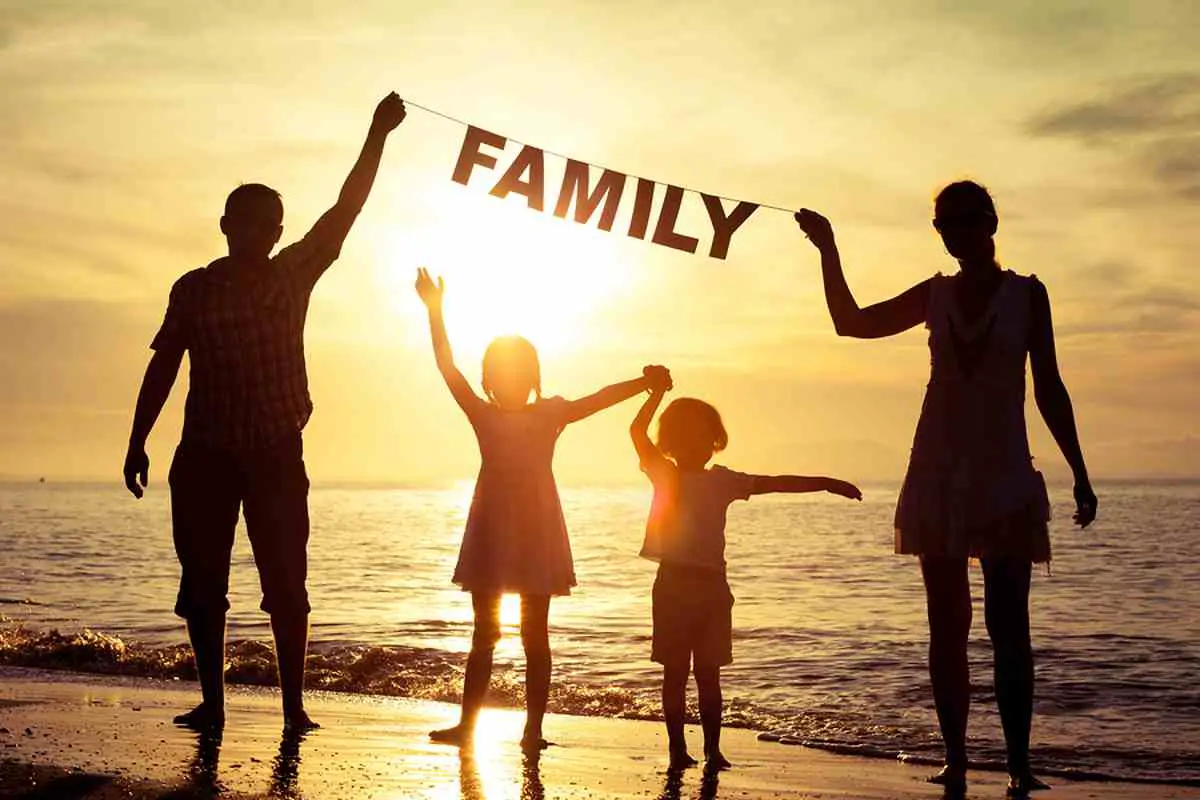
I) Types of families
- Nuclear family
This is the traditional type of family structure. This family type consists of two parents and children but not includes aunts, uncles, grandparents, etc.
We average fewer than two children per nuclear family. - Extended family
This is a family that extends beyond the nuclear family, consisting of parents like father, mother, and their children, aunts, uncles, grandparents, and cousins, all living in the same household.
We tend to live in small nuclear families rather than large extended families - Blended family
This family consists of two adults, the child or children that they have had together, and one or more children that they have had with previous partners
Blended families now outnumber traditional families. - Single- parent family
This family consists of one parent raising one or more children on his own
Children from single-parent families are more likely to get lower grades or drop out of school - Childless family
This family consists of two partners living together without having children. This may be because they cannot or they don’t want to have children.
Childless family can feel excluded from the rest of society. - Grandparent family
This is a family where children live with their grandparents. Parents bear no responsibility in raising their kids.
That boy lives in a grandparent family, he has lived with his grandparents since he was born.

II) Family members
- Parents: a person’s father or mother
Sue and Ben have recently become parents. - Father: a male parent of a child; a person who is acting as the father to a child
Ben’s a wonderful father. - Mother: a female parent of a child or animal; a person who is acting as a mother to a child
She’s the mother of twins. - Child (plural: children) : a young human who is not yet an adult
The film is not suitable for young children. - Daughter: a person’s female child
They have three grown-up daughters. - Son: a person’s male child
We have two sons and a daughter. - Sibling: a brother or sister
The younger children were badly treated by older siblings. - Spouse: a husband or wife
Fill in your spouse’s name here. - Husband: the man that somebody is married to; a married man
She’s finally decided to leave her husband. - Wife: the woman that somebody is married to; a married woman
He wants a divorce from his estranged wife.

- Grandparents: the father or mother of your father or mother
The children are staying with their grandparents. - Grandfather: the father of your father or mother
The firm had been founded by his grandfather. - Grandmother: the mother of your father or mother
I always loved going to visit my grandmother. - Granddaughter: the daughter of a your son or daughter
She watched her little granddaughter skip down the path. - Grandson: the son of a your son or daughter
Her estate went to her grandson. - Aunt: the sister of your father or mother; the wife of your uncle
My aunt lives in Canada. - Uncle: the brother of your mother or father; the husband of your aunt
I’ve just become an uncle. - Nephew: the son of your brother or sister; the son of your husband’s or wife’s brother or sister
I watched my two-year-old nephew toddling around after his puppy. - Niece: the daughter of your brother or sister; the daughter of your husband’s or wife’s brother or sister
She’d always had a soft spot for her younger niece. - Cousin: a child of your aunt or uncle
She’s a cousin of the bride.
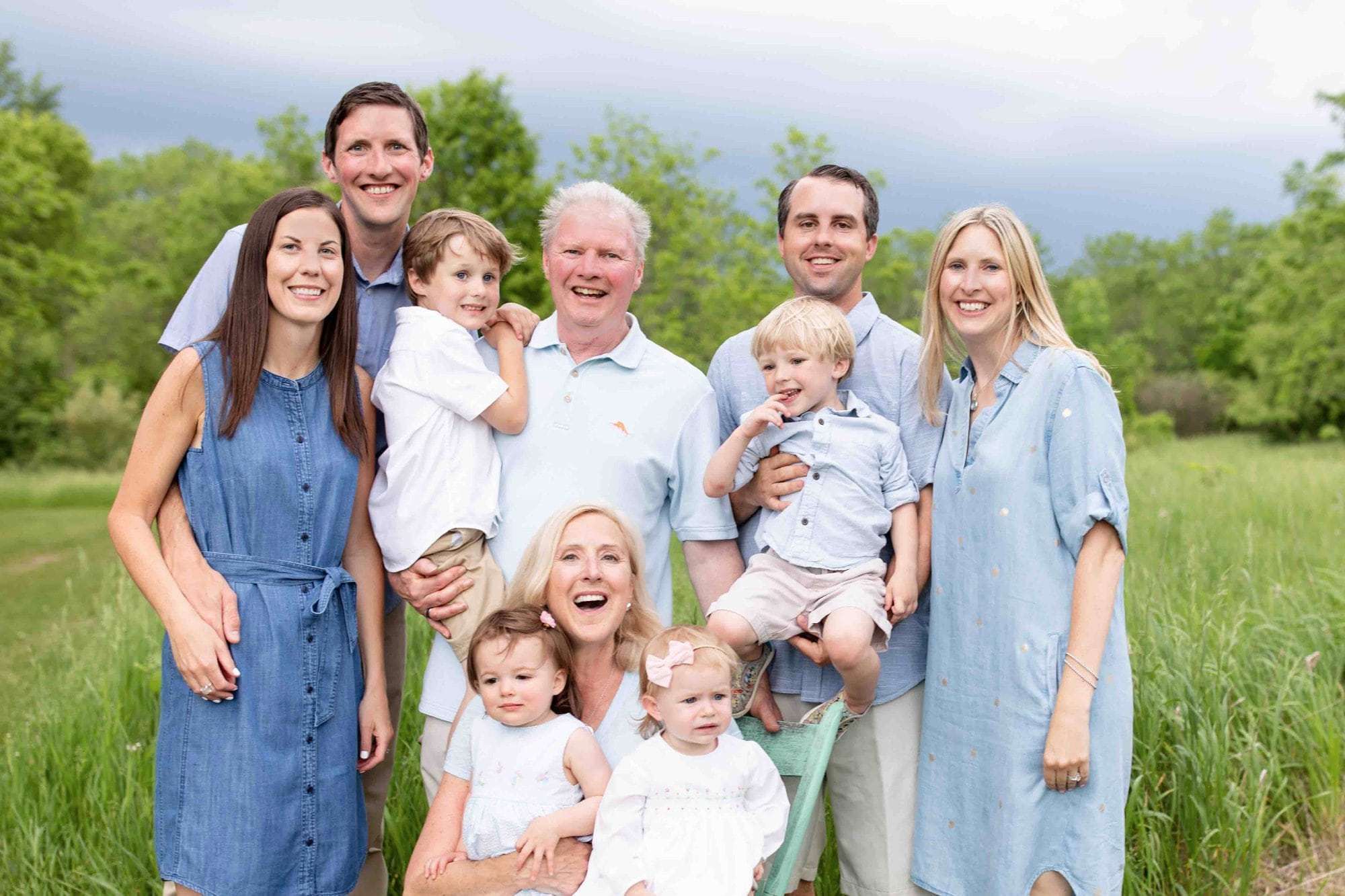
- Father-in-law: the father of your husband or wife
His father- in-law was very aggressive as he hit his wife. - Mother-in-law: the mother of your husband or wife
My mother-in-law is a nice beautiful woman. - Sister-in-law: the sister of your husband or wife; your brother’s or sister’s wife; the wife of your husband’s or wife’s brother or sister
My sister-in-law is only a 10-year-old girl, she is still very young. - Brother-in-law: the brother of your husband or wife; your sister’s or brother’s husband; the husband of your husband’s or wife’s sister or brother
Her brother-in-law really takes after her husband. - Stepfather: the man who is married to your mother but who is not your real father
He lives at home with his mother and stepfather. - Stepmother: the woman who is married to your father but who is not your real mother
Snow White’s stepmother is such a cruel woman. - Ex-husband: the man used to be your husband.
She still misses her ex-husband, who past away in an incident 3 years ago. - Ex-wife: the woman used to be your husband.
His ex-wife is much more beautiful than his “present” wife. - Half-brother: a boy or man with either the same mother or the same father as one has
He is my half-brother. - Half-sister: a girl or woman who has either the same mother or the same father as one has
My half-sister is very nice to me.
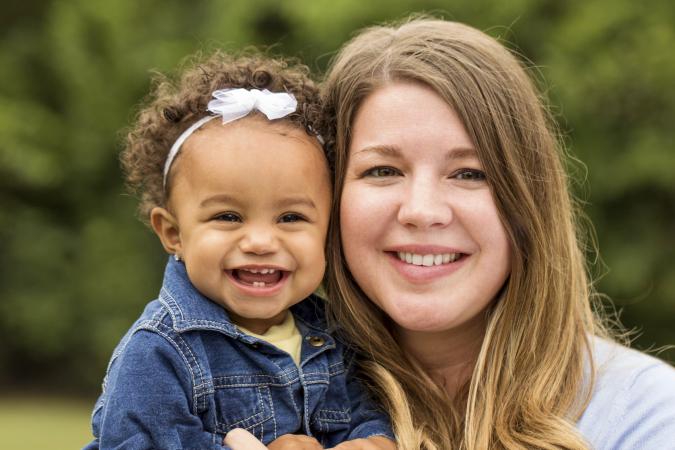
III) Common phrases about family
- To settle down: to start a family
I suppose once I settle down and have children, I’ll want to get on the property ladder.
The two families decided that it was time the couple settled down so they got down to the wedding preparation. - The coming of a new member: the time when a new member is born
Now my family are ready for the coming of a new member. - To be expecting a baby: if a woman is expecting, she is going to have a baby
Jane is expecting a baby. - To drift apart from: to lose contact, to lose one’s friendship or closeness
It is so easy to drift apart from your relatives if you don’t keep in touch with them regularly. - To enjoy someone’s company: find pleasure and satisfaction in being beside someone
We believe that we all enjoy each company in every day. - To fall for somebody: to fall in love with somebody
“Fall for you” is my favorite song that I listen to every day. - Take after: to look or behave like an older member of your family, especially your mother or father
My brother really takes after my father - Give birth to: to produce a baby
She has just given birth to a lovely girl. - Get married to somebody: become one’s wife or husband
John is very happy to get married to Sam. - Run in the family: to be a common feature in a particular family
Tanned skin runs in my family. - Get along with somebody: to have a friendly relationship with somebody
My daughter and son get along well with each other. - To tie the knot: to get married
I believe being present in a wedding is a real pleasure because tying the knot is one of the most important events in a person’s life - Flesh and blood: when you say that somebody is flesh and blood, you mean that they are a normal human with needs, emotions and weaknesses
We share the common emotions because we are flesh and blood. - Go/ turn grey: to become gray-haired; to become old
Parents work so hard to raise the children that their hair turn grey over the time. - Have a soft spot for: be fond of or affectionate toward.
He always has a soft spot for his younger baby
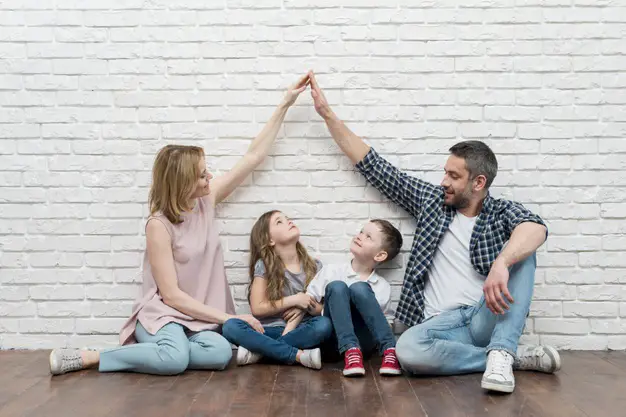
IV) Idioms about family
- Bring home the bacon: to make a living, to earn money, to achieve financial support for those at home
My mom – as a housewife, she does all the household chores, while my dad – as an officer, works outside and brings home the bacon. - Blood is thicker than water: used to emphasize that you believe that family connections are always more important than other types of relationship
You had better pay more attention to your family and relative than neighbor. Because blood is thicker than water. - A chip off the old block: someone who is very similar in character to their father or mother
Look at him, he reminds me much of his father. He’s a chip off the old block of Mr. Son - Like two peas in the same pot: used to say that two people or things are very similar to each other
The twins like two peas in the same pot, I can’t tell them apart though I meet them everyday at class. - Come hell or high water: no matter what difficulties may occur
My mother said that, though anything came hell or high water, she promised stand by and wait for me to come back. - Apple doesn’t fall far from tree: a child usually has a similar character or similar qualities to his or her parents
This year, he has just won the 1st prize in Math Competition. He studied so well, just as his father. You know that, apple doesn’t fall far from tree. - The apple of one’s eyes: a thing or person which someone loves above all others
My 2-year old little brother is the apple of parent’s eyes, he’s take after my father a lot. - Black sheep of the family: someone who makes bad decisions or has a bad reputation within a family unit
Being the black sheep of the family, I’m the only one who works as artist, while my parents are both teachers. - Men make houses, women make homes: used to say that it’s often the men who build or acquire houses for their families, but it’s usually women who provide the things that make a house into a home.
Folks rumored that men make houses, women make homes. So, in China, men often work outside to earn money, while women takes care for home.

You may also like
18
окт.
Список английских слов и фраз по теме «Семья»
Словарик на тему «Семья» — один из первых разделов, который появляется в закладках начинающего изучателя английского языка. Это обусловлено тем, что развитие разговорных навыков происходит на базе актуальных тем, которые хочется обсуждать, ведь они окружают нас изо дня в день. Это семья, работа или школа, отдых, хобби и т.д. Чтобы не тратить лишних слов, представляем вам список слов и фраз с транскрипцией и переводом на тему «Семья». Советуем вам не просто пробежаться по этому списку, но и основательно его выучить, ведь тема семьи частенько обсуждается как в деловой, так и в бытовой среде.
Базовые понятия
Таблица 1.
|
Слово |
Транскрипция |
Перевод |
| aunt | ɑːnt |
тетя |
| baby | beɪbi |
малыш, младенец |
| brother | ˈbrʌðə |
брат |
| boyfriend | ˈbɔɪˌfrɛnd |
парень, любимый, молодой человек |
| bride | braɪd |
невеста |
| cousin | ˈkʌzn |
двоюродная сестра |
| dad | dæd |
папа |
| daughter | ˈdɔːtə |
дочь |
| father | ˈfɑːðə |
папа |
| father-in-law | ˈfɑːðərɪnlɔː |
тесть, свекор |
| fiancé | fiˈɒnseɪ |
жених |
| fiancée | fiˈɒnseɪ |
невеста |
| friend | frɛnd |
друг |
| girlfriend | ˈgɜːlˌfrɛnd |
любимая девушка |
| godchild | ˈgɒdʧaɪld |
крестница |
| godfather | ˈgɒdˌfɑːðə |
крестный отец |
| godmother | ˈgɒdˌmʌðə |
крестная мать |
| grandchild | ˈgrænʧaɪld |
внук, внучка |
| grandchildren | ˈgrænʧɪldrən |
внуки |
| granddaughter | ˈgrænˌdɔːtə |
внучка |
| grandfather | ˈgrændˌfɑːðə |
дедушка |
| granddad | ˈgrændæd |
дедушка |
| grandpa | ˈgrænpɑː |
дедушка |
| grandmother | ˈgrænˌmʌðə |
бабушка |
| grandma | ˈgrænmɑː |
бабушка |
| grandson | grænsʌn |
внук |
| great-grandparents | greɪt-ˈgrænˌpeərənts |
прабабушка и прадедушка |
| groom | grʊm |
жених |
| half-brother | ˈhɑːfˌbrʌðə |
сводный брат |
| husband | ˈhʌzbənd |
муж |
| mother | ˈmʌðə |
мама |
| mother-in-law | ˈmʌðərɪnlɔː |
теща, свекровь |
| mum | mʌm |
мама |
| mummy | ˈmʌmi |
мама |
| mom | mɒm |
мама |
| nephew | ˈnɛvju(ː) |
племянник |
| niece | niːs |
племянница |
| parent | ˈpeərənt |
родитель |
| sister | ˈsɪstə |
сестра |
| son | sʌn |
сын |
| stepbrother | ˈstɛpˌbrʌðə |
сводный брат |
| twin | twɪn |
близнец |
| twin-brother | twɪn-ˈbrʌðə |
брат-близнец |
| uncle | ˈʌŋkl |
дядя |
| wife | waɪf |
жена |
Общие понятия
Таблица 1.
|
Слово |
Транскрипция |
Перевод |
| adult | ˈædʌlt |
взрослый |
| bachelor | ˈbæʧələ |
холостяк |
| child | ʧaɪld |
ребенок |
| couple | ˈkʌpl |
пара |
| descendant | dɪˈsɛndənt |
потомок |
| foster | ˈfɒstə |
усыновить, удочерить |
| kid | kɪd |
ребенок |
| elder | ˈɛldə |
старший |
| spinster | ˈspɪnstə |
старая дева |
| to adopt | əˈdɒpt |
усыновить, удочерить |
| to be divorced | biː dɪˈvɔːst |
быть разведенным |
| to bring up | brɪŋ ʌp |
воспитывать |
| to raise | reɪz |
воспитывать |
| wedding | ˈwɛdɪŋ |
свадьба |
| youth | juːθ |
молодежь |
Семейные идиомы
Пройдите бесплатное упражнение аудирования Семья на английском языке
Добавлено: 18.10.18
На этой странице вы найдете лексику на тему «Семья» (Family) на английском.
| Family Vocabulary | |
| Members of a family — Члены семьи | |
| mother | мама |
| father | папа |
| sister | сестра |
| brother | брат |
| daughter | дочь |
| son | сын |
| husband | муж |
| wife | жена |
| spouse | супруг(а) |
| grandmother | бабушка |
| grandfather | дедушка |
| uncle | дядя |
| aunt | тетя |
| cousin | двоюродный брат/сестра |
| nephew | племянник |
| niece | племянница |
| children | дети |
| a great-grandfather | прадед |
| a great-grandmother | прабабушка |
| a grandson/granddaughter | внук/внучка |
| grandchildren | внуки |
| General vocabulary — Общая лексика | |
| united family | дружная семья |
| large family | многодетная семья |
| to acquire a family | заводить семью |
| a head of a family | глава семьи |
| a member of a family | член семьи |
| to support/keep a family | содержать семью |
| to provide for one’s family | прокормить семью |
| the only bread-winner in the family | единственный работник в семье |
| unmarried mother | мать-одиночка |
| nursing mother | кормящая мать |
| father of the family | отец семейства |
| to take care about children | заботиться о детях |
| to bring up | воспитывать |
| an only child | единственный ребенок |
| host family | приемная семья |
| foster mother/foster father | приемная мать/отец |
| a ward | приемный ребенок |
| a stepmother/ a stepfather | мачеха/отчим |
| foster children | приемные дети |
| twins | близнецы |
| triplets | тройняшки |
| quadruplets | четверо близнецов |
| a third cousin | троюродный брат/сестра |
| step-brother/step-sister | сводный брат/сестра |
| offspring | потомок |
| forefather | предок |
| remote ancestors | отдаленные предки |
| Relations by Marriage | |
| unmarried | быть не замужем/не женатым |
| bachelor | холостяк |
| meeting | свидание |
| engagement | помолвка |
| to be engaged to smb | быть помолвленным |
| to marry smb | жениться на к-л |
| to marry for the second time | быть женатым на к-л |
| a spouse | супруг/супруга |
| relation in-laws | родственники со стороны жены/мужа |
| mother-in-law | теща, свекровь |
| father-in-law | тесть, свекр |
| son-in-law | зять |
| daughter-in-law | невестка |
| brother-in-law | шурин, деверь |
| sister-in-law | невестка, золовка |
| a widow/a widower | вдова, вдовец |
| divorce | развод |
| to be divorced | быть разведенным |
| to desert one’s family | бросать семью |
Проверьте свои знания по данной теме. Пройдите ОНЛАЙН-ТЕСТ!
Смотрите также:
- Английские идиомы о семье (Family Idioms)
- Английские слова для детей на тему «Моя семья» (My family)
Английские слова для начинающих по теме «Моя семья. My Family» разделены на три части: существительные, прилагательные и глаголы. В список №1 вошли только самые употребительные слова по данной теме (32 слова) с упражнениями. Английские слова, выделенные цветом, даны для общего сведения. Для закрепления лексики предлагается игра — «Мои родственники».
I. Nouns (существительные):
- father — отец
- mother — мать
- parents — родители
- son — сын
- daughter — дочь
- sister — сестра
- brother — брат
- cousin [‘kʌz(ə)n] — двоюродный брат (или сестра), кузен (кузина)
- sibling — родной брат или сестра
- second cousin — троюродный брат (сестра)
- twins — близнецы
- aunt — тетя
- uncle — дядя
- nephew [`nevju:] — племянник
- niece [`ni:s] — племянница
- grandfather — дедушка
- grandmother — бабушка
- grandparents — дедушка и бабушка
- great grandmother — прабабушка
- great grandfather — прадедушка
- grandson — внук
- granddaughter — внучка
- husband — муж
- wife — жена
- child — ребенок
- children — дети
- grandchildren — внуки
- baby — малыш
- relative — родственник
Упражнение 1. Family Members
1. Игра на английском языке (для начинающих)
Для того чтобы запомнить названия родственников и научиться произносить правильно nephew, niece, aunt, uncle, parents, cousin, предлагаю поиграть в следующую игру онлайн.
Как играть. Перед вами разложены карты. Они перевернуты. При нажатии на карту — диктор произносит название члена семьи, при этом карты переворачивается, и вы видите слово. Суть игры заключается в том, что надо запомнить, где находятся одинаковые карты, тогда при последовательном нажатии на них, они исчезают. Нужно избавиться от всех карт как можно быстрее. Запомните свое время и в следующий раз постарайтесь поставить рекорд — Игра Members of the Family (К сожалению, поиграть в игру сейчас нельзя, сайт-партнер ее удалил…)
Английские слова для начинающих по теме «My Family». Список слов №1 (продолжение)
II. Adjectives (прилагательные):
1. large — большой
2. small — маленький
3. young — молодой
4. younger — младший
5. old — старый
6. elder — старший
7. close — близкий
8. friendly — дружелюбный
9. favourite — любимый
10. loving — любящий
Прилагательные в английском языке не имеют окончаний и не изменяются в роде и числе. Прилагательное large — переводится большой, большая, большое, большие
III. Verbs (Глаголы):
1. have got* — иметь
2. love — любить
3. love very much — любить очень сильно
4. take care of — заботиться о
2. Проверьте себя, знаете ли вы английские слова по теме «My Family»
Кликните 2 раза по слову мышкой для самопроверки.
- father
- mother
- parents
- sister
- brother
- cousin
- twins
- aunt
- uncle
- nephew
- niece
- grandfather
- grandmother
- great grandmother
- husband
- wife
- child
- children
- baby
- relative
- large
- small
- young
- younger
- old
- elder
- close
- friendly
- favorite
- loving
3. Выражения по теме «My Family» для начинающих:
1. I have got (I’ve got) – У меня есть …
2. I have not got (I haven’t got) – У меня нет …
3. my* elder sister – моя старшая сестра
4. my younger brother – мой младший брат
5. love very much – очень сильно люблю
6. my favourite relative is – мой любимый родственник
*Местоимения в английском языке не изменяются в роде и числе. Местоимение my переводится мой, моя, мое, мои. Познакомиться с темой Местоимения в английском языке.
4. Проверьте себя, можете ли вы ответить на вопросы по теме «My Family»:
- Is your family large or small?
- What relatives have you got?
- Who is your favourite relative?
Learn Family Words in English. This English lesson lists some common Family Words for English Language Learners.
Family Words in English
Words and phrases below are used when talking about family and relationships.
- Siblings
- Relative
- Nuclear family
- Childhood
- Sister-in-law
- Brother
- Sister
- Wife
- Husband
- Cousin
- Nephew
- Niece
- Son
- Grandson
- Granddaughter
- Daughter-in-law
- Stepmother
- Stepson
- Stepdaughter
- Stepsister
- Stepbrother
- Half-brother
- Half-sister
- Grandparents
- Masculine
- Feminine
- Children
- Grow up
- Brother-in-law
- Stepfather
- Foster family
- Female
- Male
- Grandfather
- Grandmother
- Married
- Father
- Mother
- Uncle
- Aunt
- In-laws
- Ex-husband
- Twin
- Widow
- Widower
- Ex-wife
- Divorced
- Engaged
- Separated
Family Members
Here are family members vocabulary with examples.
- Brother
My brother and I differ in many ways.
- Sister
I share a bedroom with my sister.
- Wife
He adores his wife and children.
- Husband
She introduced him as her future husband.
- Cousin
The house belonged to my cousin.
- Nephew
He entrusted his nephew with the task.
- Niece
He has a pretty niece.
- Son
Their son will start college in September.
- Grandson
Jack carried his grandson up the stairs.
- Granddaughter
Her granddaughter lives abroad.
- Daughter-in-law
My daughter-in-law is a lawyer.
- Grandfather
Her grandfather taught her to conjure.
- Grandmother
She inherited a fortune from her grandmother.
- Father
His father is a staff sergeant in the army.
- Mother
Her mother was a brilliant scientist.
- Uncle
I don’t have much contact with my uncle.
- Aunt
My aunt always remembers my birthday. She sent me a card with birthday wishes.
List of Family Words | Infographic
Common Family Words in English
Last Updated on July 29, 2020

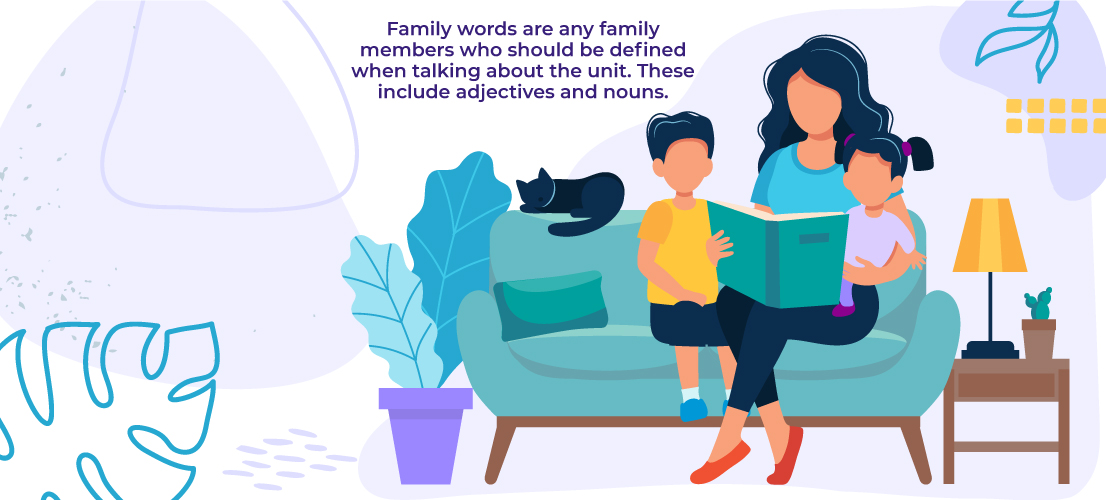
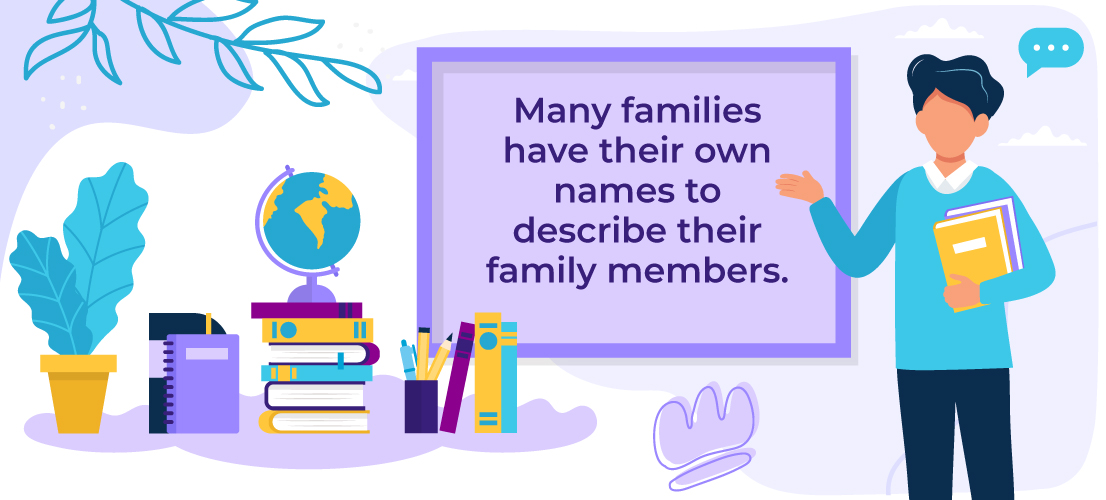



.png)

